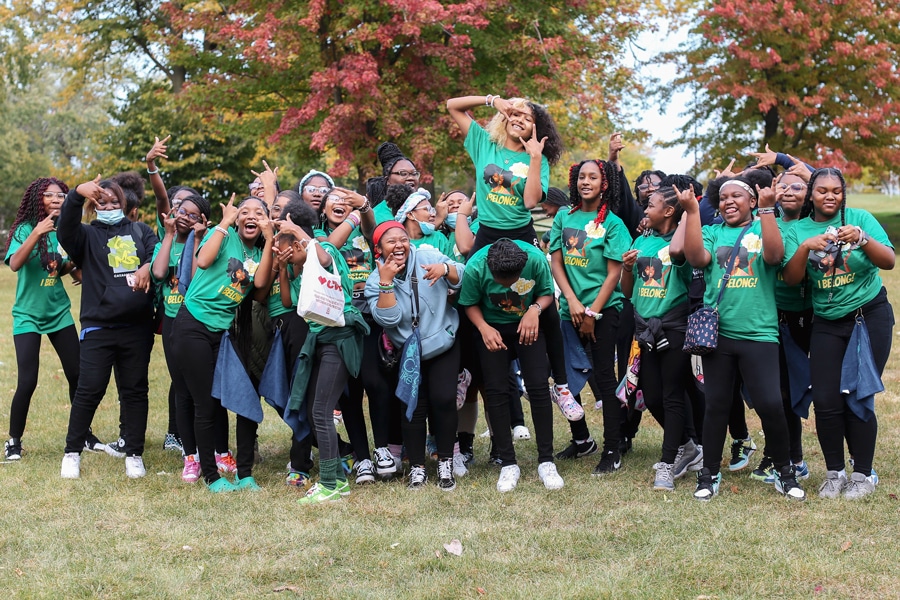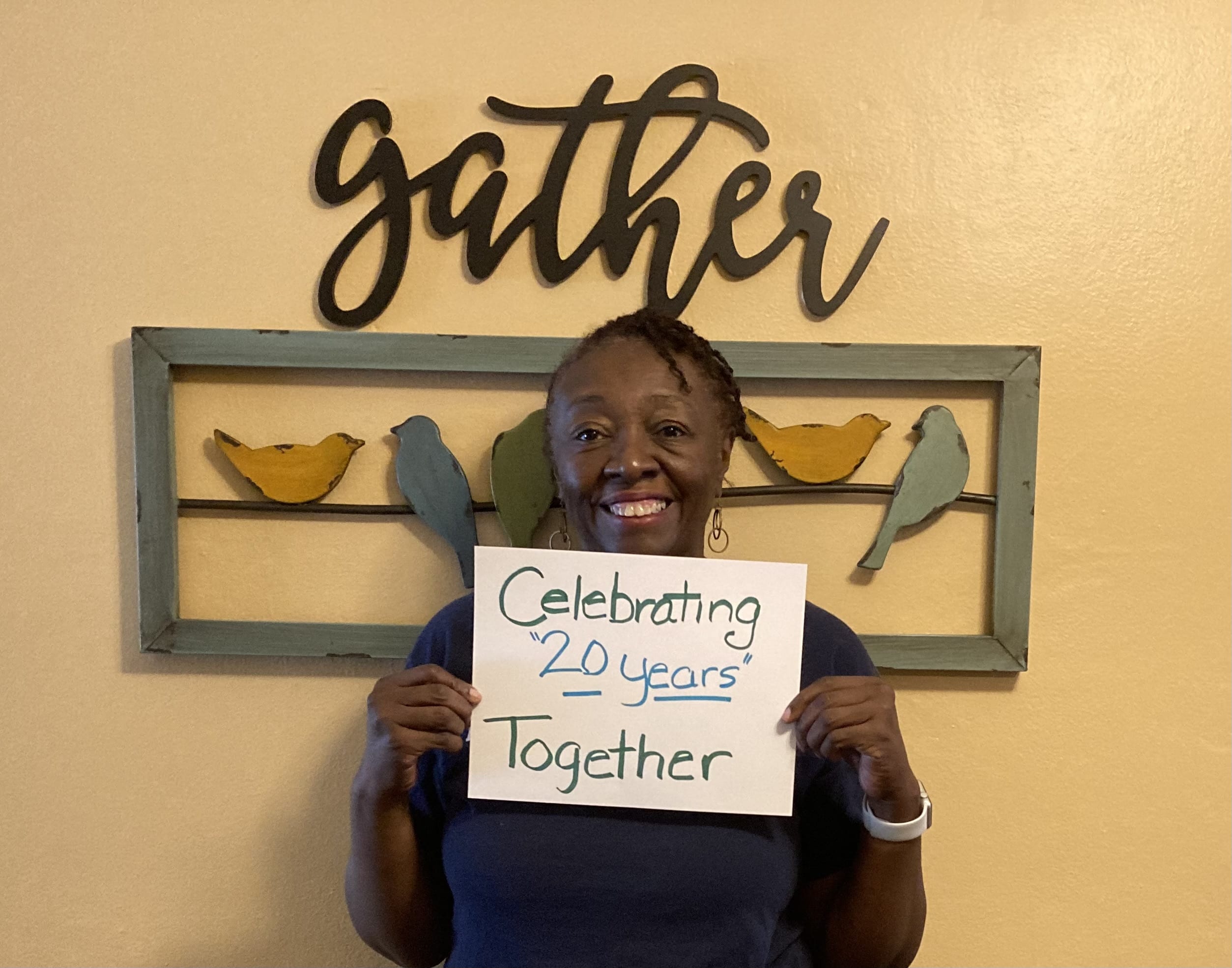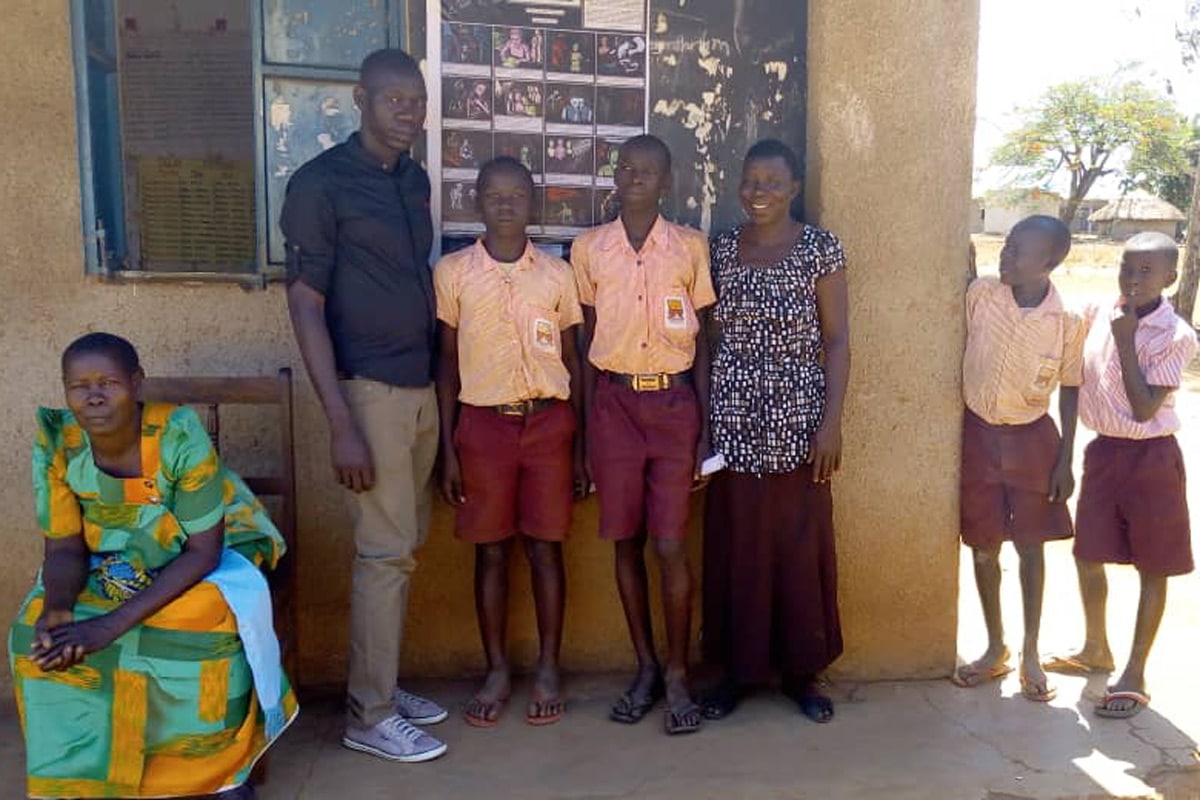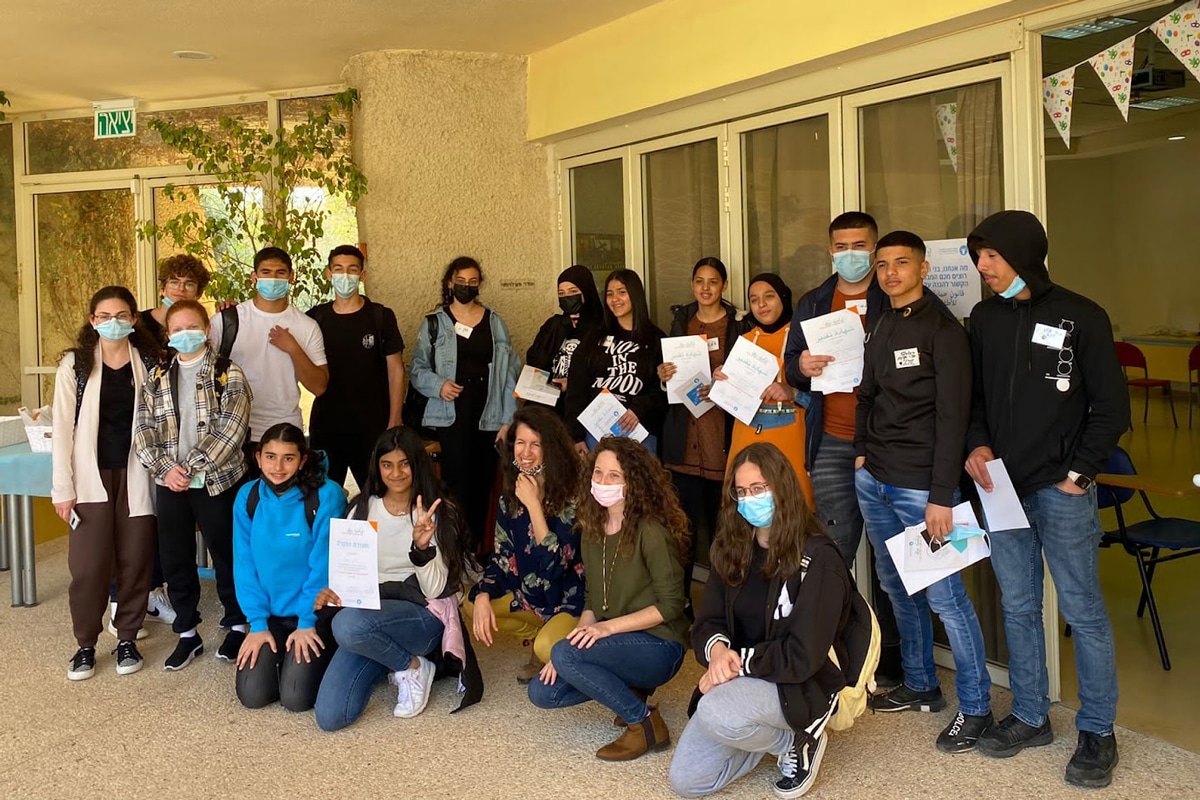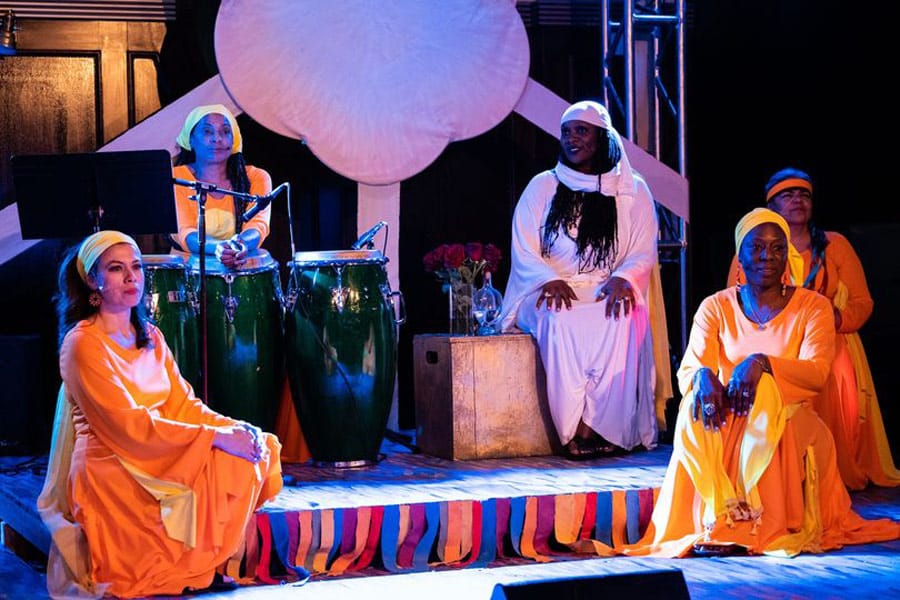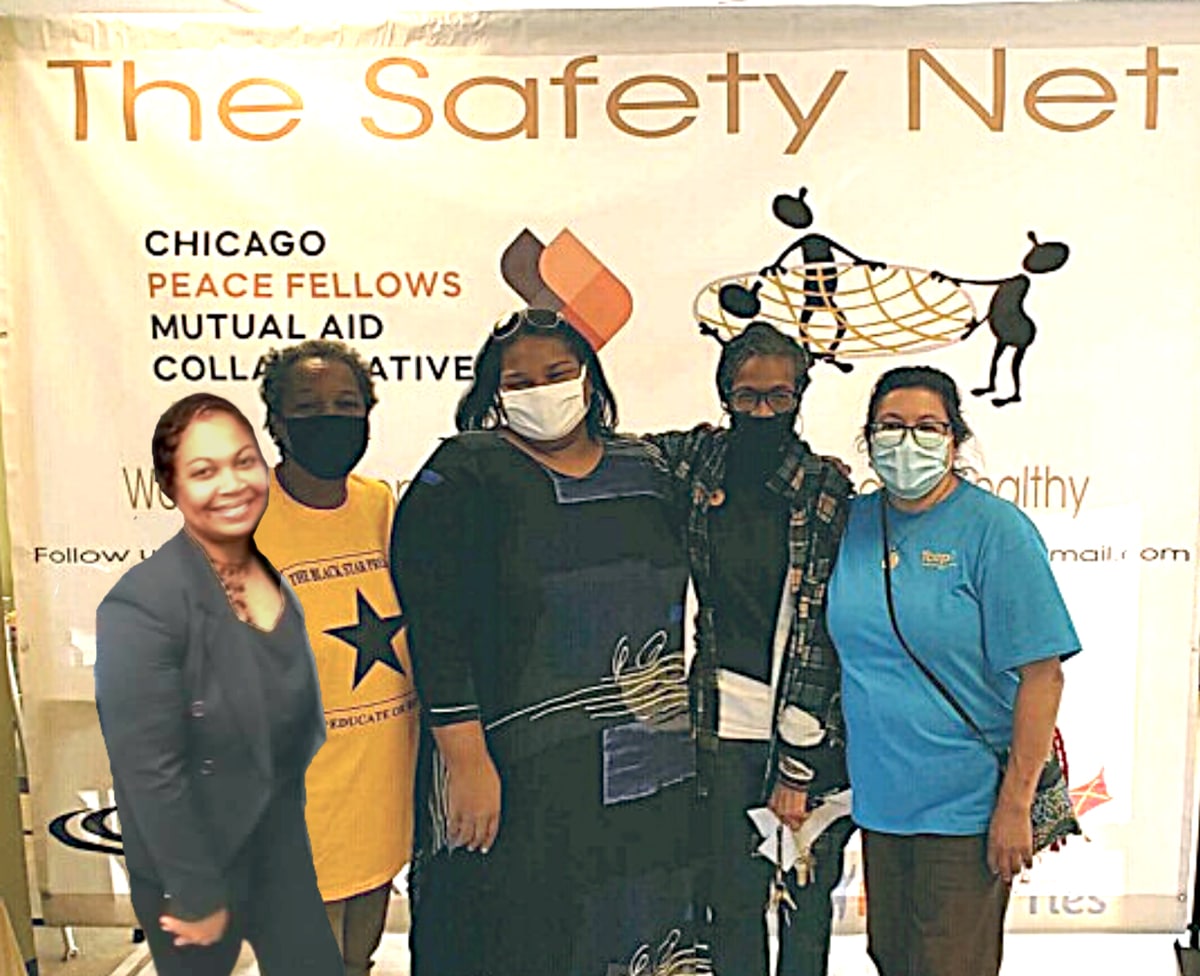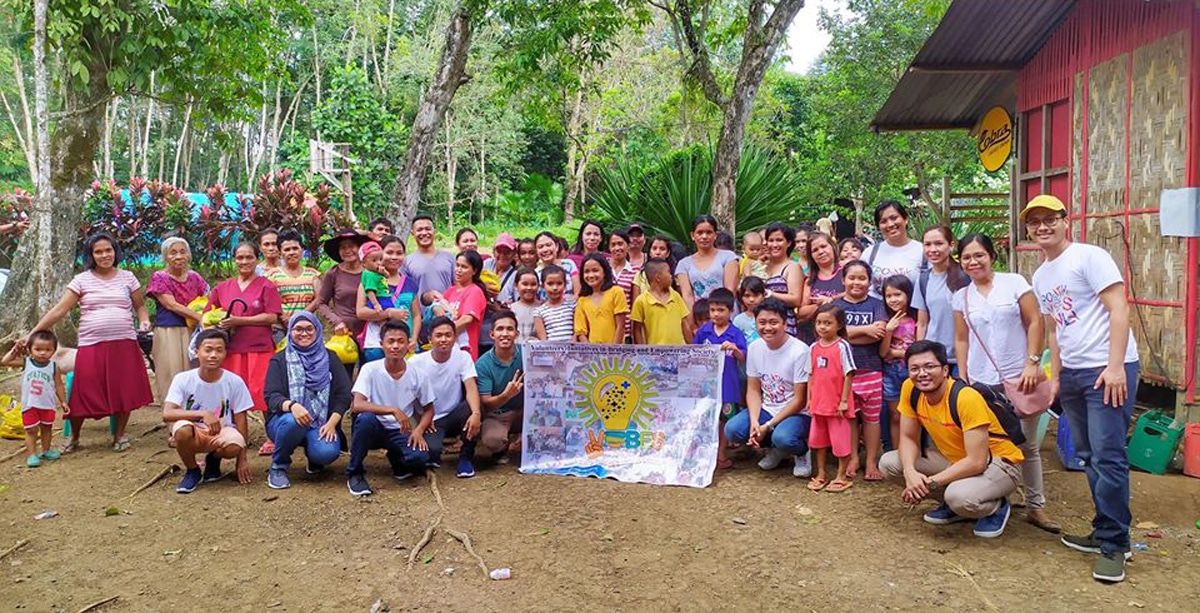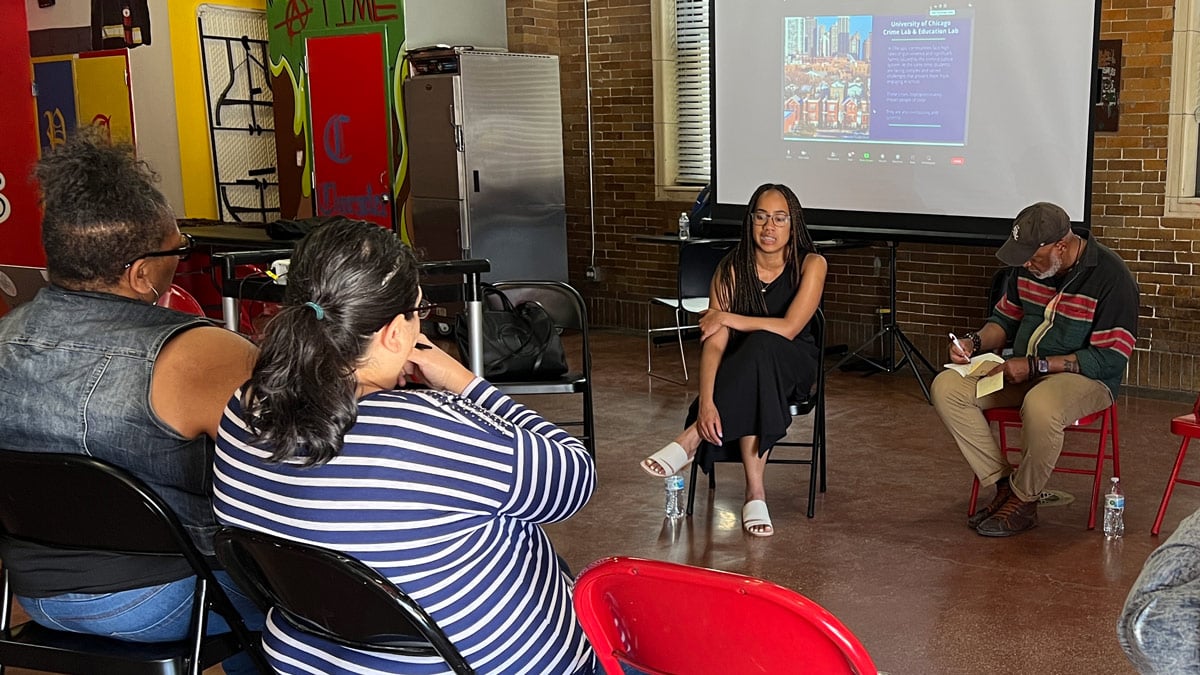Celebrating the Chicago Day of the Girl
by Zeki Salah, Mutual Aid Collaborative Facilitator

On October 11, the Girls Like Me Project, Inc. hosted the 11th annual Chicago Day of the Girl at the South Shore Cultural Center. The event coincides with the International Day of the Girl, which is an international observance day established by the United Nation on October 11, 2012 to increase awareness of gender inequality faced by girls worldwide and to support more opportunities for them. The Chicago Day of the Girl focuses on recognizing and providing opportunities for Black girls ages 13 to 18 years old in the City of Chicago.

This year, the theme of the Chicago Day of the Girl was “I Belong” and the programming was aimed towards reclaiming spaces for Black girls that often feel inaccessible. La’Keisha Gray-Sewell, a 2020 Chicago Peace Fellow and the Executive Director of the Girls Like Me Project spoke to the importance of reinforcing the girls’ right to spaces throughout the city: “Many girls feel like they only belong in certain spaces and that they are confined to their neighborhoods. So we wanted to build a sense of belonging: they belong to this city and that this city belongs to them.” The Chicago Day of the Girl worked to address the way the city is segregated by race, class, and income by showcasing how different organizations and resources can be utilized to celebrate and center the voices of Black girls. The South Shore Cultural Center also made for a significant venue because it gave the girls an opportunity to be in an establishment that is seen as exclusive.

Chicago Public Schools across the city participated in the Chicago Day of the Girl, with 253 girls attending in total. The University of Chicago Charter School Woodlawn, Gary Comer Charter School, and Nicholson STEM Academy were some of the schools that were connected to the Chicago Day of the Girl through partnerships with the Girls Like Me Project, Inc. The event was held from 10am - 3pm, allowing the girls to leave the classroom and receive educational enrichment outside of their schools.

As an educational enrichment opportunity outside of the classroom, the Chicago Day of the Girl was able to address issues that receive limited attention in schools, allowing programming to be gender responsive and internationally oriented. The day’s activities aimed to make the girls in attendance feel like they belong and are included in a global empowerment conversation. The Chicago Day of the Girl originally grew out of the Girls Like Me Project’s Global Connections program, which aimed to show girls in Chicago what girlhood looks like in other spaces around the world. This has influenced programming to have an international reach, that aims to not only bring the voices and perspectives of Black girls into international conversations, but also to provide resources that help them travel internationally.

Girls who attended the Chicago Day of the Girl were provided with connections to the global community and opportunities for international travel by local international organizations. WorldChicago, an internationally-oriented nonprofit focused on citizen diplomacy, presented their Youth Diplomat program to the girls in attendance. This program admits students to engage in cross-cultural conversations with international peers and attend lectures and workshops with global and Chicago area academics, government officials, and community leaders. Tiffany Smith, a travel writer from Bronzeville, also shared her experience traveling outside of the country and the barriers to travel she faced as a Black girl. The Global Strategists Association addressed some of the challenges girls might face by sharing information about passports. The Girls Like Me Project will also sponsor passports for three girls who attended the Day of the Girl, as well as African ancestry tests. Collectively the organizations involved provided tools for Black girls to engage with girlhood internationally while also showing that their voices are needed in an international space.

Organizations across the city of Chicago also collaborated to show their commitment towards supporting, celebrating, and amplifying the voices of Black girls. Damon Reed, a local Chicago artist, came and showcased murals that girls involved in the Girls Like Me Project painted with his support. The murals depict missing Black girls whose stories have not received significant media coverage. Dr. Ruby Mendenhall of UIC Champaign-Urbana also created an exhibit which was featured at the Day of the Girl by working with the mothers and daughters of the Girls Like Me Project. Their exhibit featured portraits of what brings them joy and healing. These projects showed the girls in attendance the importance of their experiences and how their stories can be told in a powerful and influential way.

The Chicago Day of the Girl provided Black girls from Chicago with a sense of belonging within both local and global communities and emphasized their capacity to enact change. The girls who attended were given tools for advocacy by the participating organization and a platform for self-expression. Local talent was also showcased, with dance performances from the Girls Like Me Project, music, a teen talk show, and a performance from Dee Dee Davis of the Bernie Mac Show. Reflecting on the day’s events La’Keisha Gray-Sewell said, “this day was all about Chicago girls and uplifting them and providing them with a platform to celebrate themselves.”
Celebrating 20 years of grassroots leadership and social change
By Jassi K. Sandhar, Global Research Fellow
It is very rare to find organizations like the Goldin Institute. As an employee of the Institute, I promise this is not a biased opinion. Having worked in the non-profit sector for 12 years, being involved in various social justice and human rights projects, the Goldin Institute has stood out as an organization which embodies principles of justice, fairness, equity, and kindness both within the Institute itself and in the work we do.
The importance of adopting grassroots approaches in social justice work is becoming increasingly recognized, but the approach taken by the Goldin Institute over the past two decades goes beyond that. It is grassroots-led and embedded in compassion, kindness and learning, from everyone but most especially those closest to the issues. We promote the voices of those often excluded who have the most at stake in making progress and ensure that they have leadership roles in every social change movement. Which is why it is extremely exciting to celebrate 20 years of the Goldin Institute.
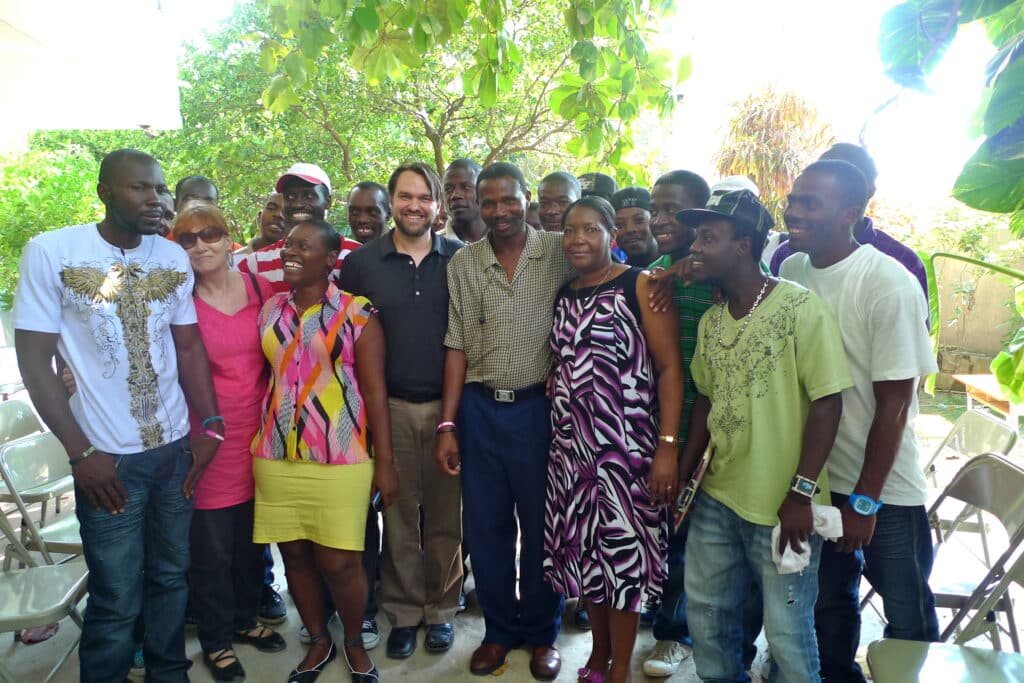
Our commitment to community-driven social change was foundational from our very inception. In October 2002, grassroots leaders from over 25 cities around the world convened in Chicago to learn from each other to collaboratively determine the mission, values and strategy of what became the Goldin Institute. The Goldin Institute was born through this conversation as an enduring platform to provide grassroots community organizers with tools and support they need to build meaningful partnerships within and between their cities. Fast forward to today, the Institute has expanded its reach to 150 Alumni leading change in 40 countries (and growing)!
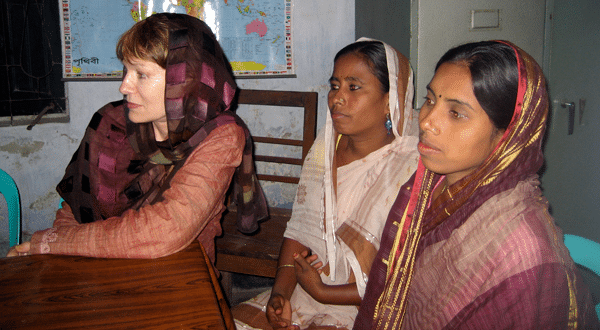
The last 20 years have taken us on an inspiring and incredible journey. We have worked with grassroots leaders in over 50 countries on issues such as:
- Child Soldier Reintegration in Uganda: In the discussions about disarmament, demobilization and reintegration of children used as soldiers in the conflict in Northern Uganda, the voices and perspectives of former child soldiers have too long been ignored. Former child soldiers themselves led a ground-breaking oral testimony process by interviewing over 150 of their peers and together reflecting on common concerns and shared aspirations that led to the creation of YOLRED, the first reintegration and support organization designed and run by former child soldiers.
- Addressing the Water Crisis in the Philippines: In war-torn Mindanao, over 70% of the population lacks reliable access to safe drinking water. Through the leadership of Global Associate Susana Anayatin and her team, over 40,000 people now have access to safe water in the region through the installation of water wells at over 140 local schools. In addition to providing a critical resource, this project brings together all sides of the conflict who are working together to “win the peace”.
- Tackling Gender-Based Violence in Haiti: Since the January 2010 earthquake in Haiti, women and girls living in the internally displaced persons camps face alarming rates of rape and other forms of gender-based violence. Through the leadership of Global Associate Malya Villard’s and KOFAVIV, men have joined the movement to provide security and advocacy to end all forms of gender-based violence in Haiti.
- Improving Microcredit in Bangladesh: The current global debate about the efficacy of microfinance is marked by the absence of those who have most at stake in the controversy: loan recipients. The Goldin Institute worked with partner organization Nijera Kori to lift up these voices, most often marginalized women, and restore their perspectives, insights and aspirations to the discussion, leading to the return of indigenous community support systems and greater regulation of the microfinance industry in Bangladesh.
- Mutual Aid Collaborative in Chicago, USA: Today, Chicago is stained by an enduring legacy of racial injustice that is laid bare by the disproportionate impact of the twin pandemics of violence and COVID-19 on our communities on the South and West sides of Chicago. In response, the Chicago Peace Fellows launched the Mutual Aid Collaborative as a model of the structural changes they seek, practicing a model of shared leadership, collaborative decision-making and collective action.
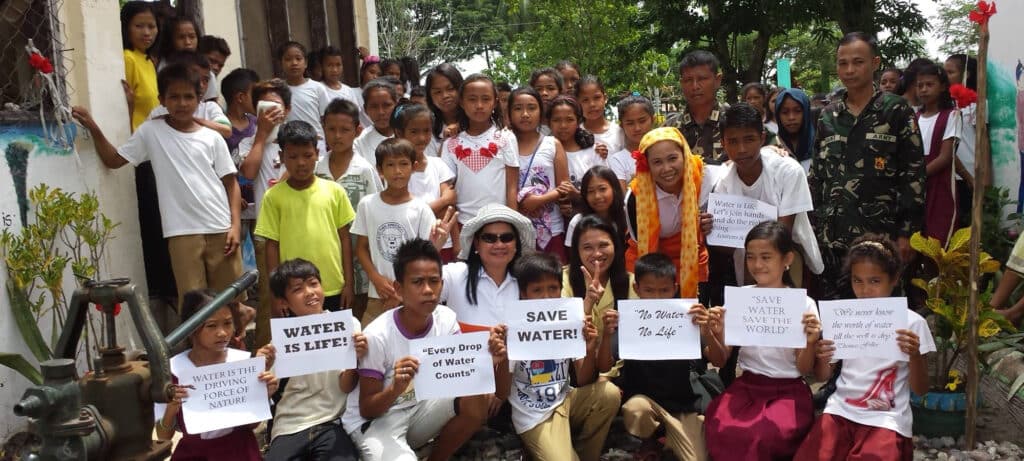
In 2018 we made significant strides in facilitating a global network of community leaders through launching GATHER, a tablet-based mobile learning tool to empower communities of practice. GATHER allows peers to learn, work and reflect together using practical tools. That same year, the Institute launched the Global Fellows program, an international cohort of 20 Fellows who collaborated with one another through a progression of learning about new theories of community engagement, practicing these ideas in their own areas, and reflecting together as a global community of practice.
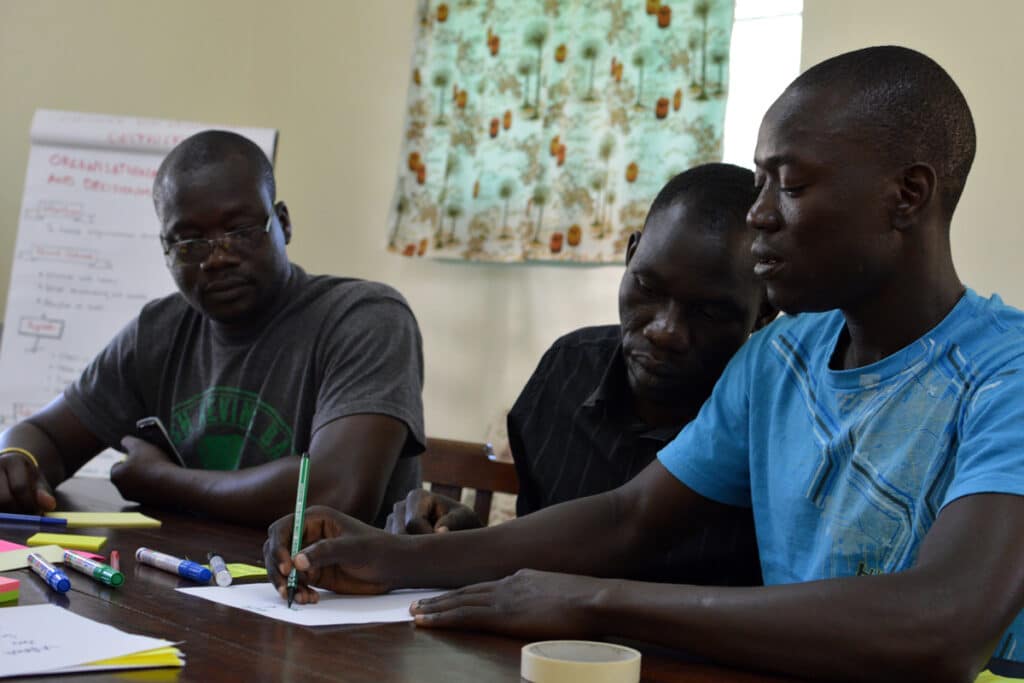
The success of the 2018 pilot has seen the GATHER course run annually with the Chicago Peace Fellows program and the Global Fellows program and, to date, we have trained 150 grassroots leaders in 40 countries in the GATHER curriculum. These grassroots leaders are local community or civil society leaders and practitioners, and represent a diverse group of backgrounds, ages, genders, and locations, and work on a range of pressing and urgent social justice issues. We are excited to continue this international Fellows program and excited to see what we can achieve together in the next 20 years.
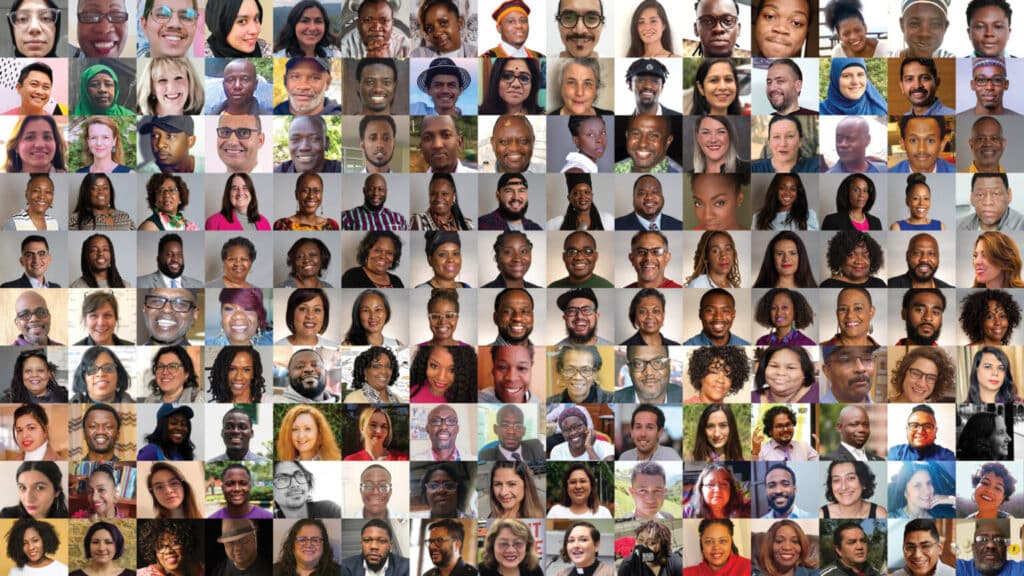
We thank you for sharing the last 20 years with us; we are particularly thankful for the continued commitment of our supporters who have stood beside us and ensured the vital work of our global network continues.
“Malya Villard Appolon, the founder of KOFAVIV (women's commission of victims for victims in Haiti), wishes the Goldin Institute a happy 20th anniversary for the good work it is doing around the world. It is because of the Goldin institute that KOFAVIV still exists today. It is still helping women who are suffering from tragic violence under armed gangs who are doing violence in all forms especially sexual violence that does not give chance to neither women nor girls. I will never regret that day Goldin Institute came our way. I am very proud of the Goldin Institute. I urge all organizations in the world to support Goldin to continue to bring change to the most vulnerable people within the Haitian society and other global communities. Thank you.” - (Malya Villard Appolon, Global Associate from Haiti).
YOLRED Begins Apprenticeship Program for Children Born of War
By Geoffrey Omony, 2018 Goldin Global Fellow, Uganda
We are delighted to announce the launch of YOLRED’s new apprentice program for Children Born of War (CBOW). In the Northern Ugandan context, CBOW refers to children who were born during captivity to combatants under the Lord’s Resistance Army. The war ended over a decade ago, but there are now approximately 6,000-8,000 CBOW living in Northern Uganda, many in Gulu district (where YOLRED is based). YOLRED have carried out extensive activities with the war-affected community, and we have found that what is most required for children born of war is economic empowerment and support. There are organisations conducting research projects and doing advocacy work, like ours, to try and reduce stigma against CBOW on a mass scale, but what is really lacking for CBOW is adequate livelihood opportunities. Even within organisations which try to tackle discrimination against CBOW there is a lack of job opportunities for them.

For this reason, YOLRED began thinking about a new initiative specifically designed to address this gap and to offer a form of economic empowerment which was not being attended to elsewhere, and thus in February 2022, we began this apprenticeship. YOLRED was provided with financial assistance to pilot the apprenticeship program for 6 months, to test the model and assess how it could work in practice. This donation funded the pilot program from February – July 2022; recognizing the importance of this apprenticeship and what it promotes, we have been awarded a grant from the CBOW project to fund this program for an additional year.
“The importance of this apprenticeship and what it promotes has been recognized by the CBOW Project; we are delighted to announce that we have been awarded a grant from them to continue this program for an additional year.”
This project was born out of an identified need amongst war-affected youth and is focused on children born of war (who are a category of marginalized youth in Northern Uganda), with greater attention paid to girls who face greater burdens. This program has been initiated to provide a career pathway for these marginalised young people as well as on-the-job training, and ultimately economic and social empowerment. Economic empowerment is the best way to support those most impacted by the conflict, and something we at YOLRED believe is essential to the continuation of a peaceful existence in the region.

The current apprentice, who is a young woman, has been employed with YOLRED since February 2022; her parents are categorized as the formerly abducted, and she was born in captivity. Her parents managed to escape the conflict when she was a young girl, but nonetheless she found reintegration a challenge due to environment she returned to, which stigmatizes CBOW. Of this opportunity, she states the following:
“Being an apprentice at YOLRED is a tremendous and miraculous thing that has ever happened to me. It has empowered me to be able to support myself and my close associates. Many people think that children born of war cannot do anything productive in life as a result of the traumatic experiences we incurred. This job will allow me to prove them wrong because I am able to challenge their negative perceptions about children born in captivity and show the positive ways in which we can work and interact with others, reducing the level of stigma on me and other children born of war. With my experience as an apprentice in mind, I feel any apprenticeship opportunity will be a great help to my brothers and sisters who were also Born of War.”
Having run this program for six months we have recognized its extreme value and importance not just the individual apprentice but for the wider CBOW community in Northern Uganda. Positions like this help to combat stigma against CBOW, especially for girls and women, but can also encourage other organisations and companies to follow suit and offer similar programs.

Extensive research has been done in Northern Uganda to assess the impact of the protracted conflict (which took place from 1987-2006) on children, including children abducted to serve in the Lord’s Resistance Army and children who were born in captivity. Many ex-child soldiers and CBOW who have returned still do not consider themselves free; they remain confined due to post-conflict struggles and excessive stigma and exclusion. As an organization which supports peace in the region, we are particularly focused on providing economic opportunities to those who face stigma or marginalization as a result of the conflict. There is also a lot of intergenerational trauma for children born in captivity who, if their background becomes known, are often labelled the dehumanising terms ‘rebel children’. These children experience a lot of social exclusion and bullying (which can lead to school-dropouts or desire to move to other cities), as they are often not accepted by extended family members and peers. Which is why this apprenticeship program is so valuable and important.

YOLRED adopt a ‘nothing about us without us’ policy and our initiatives are informed by local impact agendas. Our efforts are rooted in the region and led by Acholi people, rather than an approach which is imposed on us, and we centre survivors-needs in all of our programs.
Hands-On Peace: how youth leadership leads to peace
By Jamal Alkirnawi, 2018 Goldin Global Fellow, Rahat, Israel

"We all feel that the violence in Israeli society is increasing and threatening to get out of control. To prevent this grim scenario, it is not enough to deploy police forces and create deterrence. We must deal with the unrestrained functioning of the social networks that intensify the conflict in general and among the younger generation in particular."

The availability of social networks and electronic devices has created echo-chambers that drastically reduce the amount of information that contradicts and challenges our accepted perceptions. This significant drop in exposure to reliable and critical sources of information affects the youth specifically, resulting in herd behavior of acting without critical and adequate thoughts. This phenomenon can be explained by the growing sense of individualization among the post-1980 generations. These generations are the Y, Millennials, Z, and A generations, which we understand as Gen Y refers to those born between 1980 and 1985; Millennials were born between 1986 and 1995; Generation Z was born from 1996 until 2010; and the newest generation, generation alpha, are those born between 2010 and 2020s.
The culture of the internet interwoven with traditional beliefs oftentimes creates a contradiction between old and new values. Consequently, the tension we are observing in our Israeli communities in general, and particularly the Bedouin community, represents a period of transition from tradition to modernization. On one hand, our older generation Y group maintains their norms and practices; their traditions. On the other hand as the era of the internet permeates social networks, individualization has rapidly become a symbol of freedom and liberty. This, in turn, shapes the identity, language, and behavior of the members of Arab society. For instance, the usual norm in the Arab community is that families can make important decisions in determining the course of individuals’ lives. However, since the rise in internet usage the dynamic has become less and less reliant on the family and community. Everyone is occupied with his or her own virtual world and unable to create social contacts with outside environments, which is, in this case, their community.

In the recent escalation and the extreme cases of violence in the cities involved, we have seen the extreme consequences of this phenomenon. Teenagers got carried away by a wave of radicalization and instigation; they took to the streets to sow anarchy. Notable cases of this phenomenon are the events of “Operation Guardian of the Walls”, in which violent incidents and large-scale riots took place across Israel in May 2021. Hundreds were injured and three casualties were reported. This was overwhelming proof demonstrating the need to better educate teenage boys and girls to reduce the severe violence and incitement on digital networks.

To address the issue we initiated a new project in 2021. It is operated by the New Dawn Association in the Negev, a Bedouin-Jewish partnership located in the city of Rahat. So far, over 600 students in the Rahat area have been participating and benefiting from the series of educational sessions. We are currently looking into expanding the outreach to include the youth from nearby areas. The project promotes leadership programs and imparting skills to youth in the Bedouin society. Our long-term goal is to develop a generation of online activists who promote respectful democratic discourse and curb the violence and ranting therein.
To do this, we devote a lot of our resources to creating knowledge. We develop a wealth of expertise and tools that help the youth navigate the internet well. These include basic knowledge of principles of democracy, the difference between freedom of expression and incitement/hate speech, and how to create respectful discourses when engaging in online dialogues.
Our initiative of educating the Bedouin youth could not have been rolled out without the support from the partnerships, and foundations that sponsored in each and every capacity. We sincerely thank Eli Hurvitz and Foundation קרן שותפות for the generous and indispensable championship.
READ MORE AT
- https://www.jdn.co.il/video/1794825/
- https://www.israelhayom.co.il/magazine/hashavua/article/10194654
Mutual Aid Collaborative Launches Safe Cycling Project
By Zeki Salah, Mutual Aid Collaborative Facilitator
On April 14 at 6:15 am, Juliet Jones received a call from her son and was surprised to hear a police officer on the other end of the line. He asked if she knew a man named Julien Jones. When she replied that Julien was her son, the officer notified her that he had been hit by a car while riding a bike to work and was on his way to the emergency room.
Julien resided in North Chicago and did not have an affordable way to get to work, leading him to use a bicycle and become seriously injured in his accident. When Juliet first saw Julien after his accident, he was bruised, unconscious, and required a cranial operation. She nearly fainted after hearing the news. Julien was in the hospital for three weeks, from April 19 - May 2. Then from May 2 – May 23, 2022, Julien received inpatient therapy at the Shirley Ryan Ability Lab. He is out of the hospital now but sustained a traumatic brain injury.
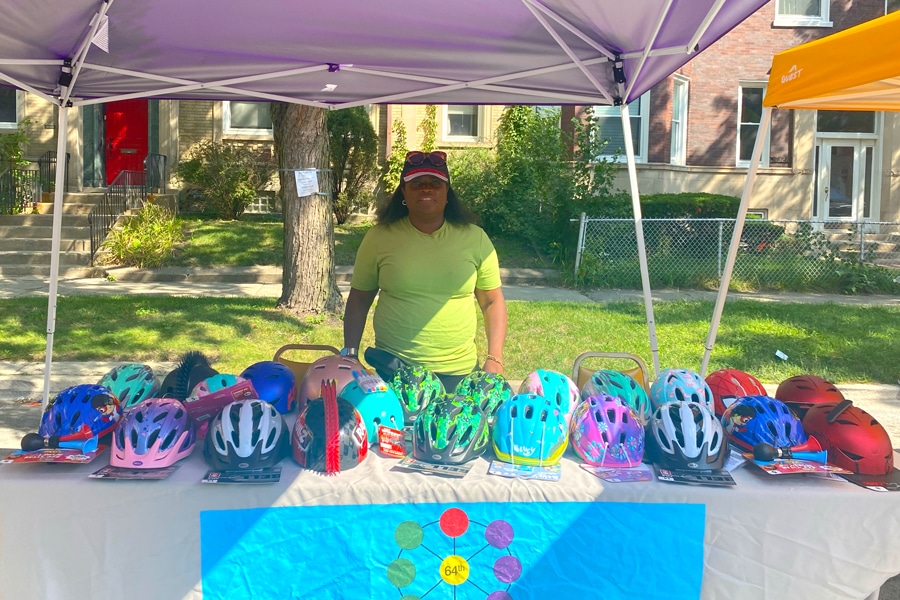
Juliet, a 2021 Chicago Peace Fellow, reflected on the accident that affected her son and wondered what would have happened if Julien had worn a helmet. The thought of averting similar tragedies motivated her to launch a Safe Cycling project through the Chicago Peace Fellows Mutual Aid Collaborative. Regarding her decision to begin the project, Juliet stated:
Violence is violence. A traffic accident or bike accident are not the same as gun violence, but those accidents are violent and traumatic and I want to do something about that.
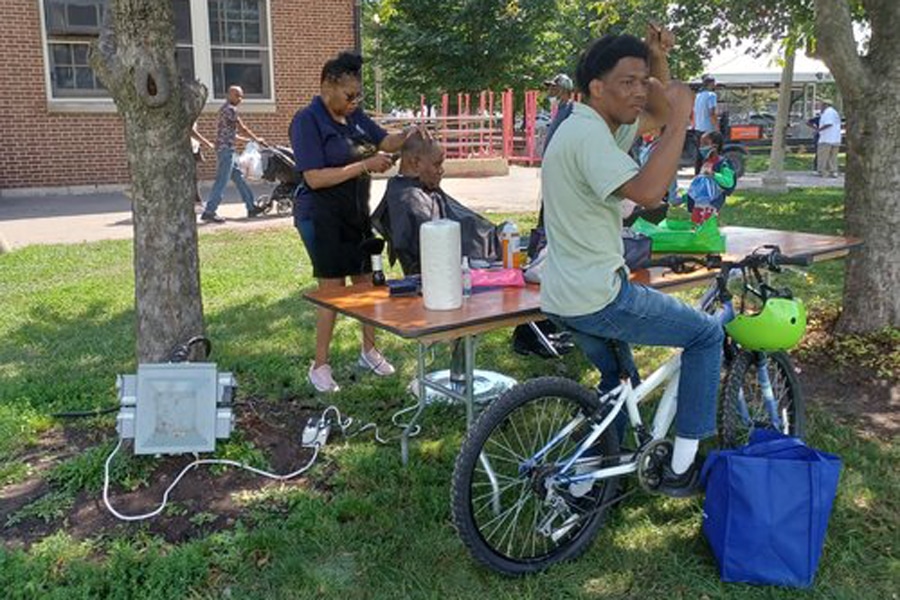
Juliet and her organization, the Original Sixty Fourth Street Beach Drummers, Inc., are now working with the Mutual Aid Collaborative to distribute helmets throughout Chicago. The Mutual Aid Collaborative consists of 60 Black and Brown leaders and committed allies who live and work in the communities they serve on the South and West sides. They have raised over $100,000 to support several active projects, including the Safe Cycling project. The Mutual Aid Collaborative met and collaboratively voted in May to fund the Safe Cycling project and their effort to purchase helmets and distribute them to communities around Chicago.
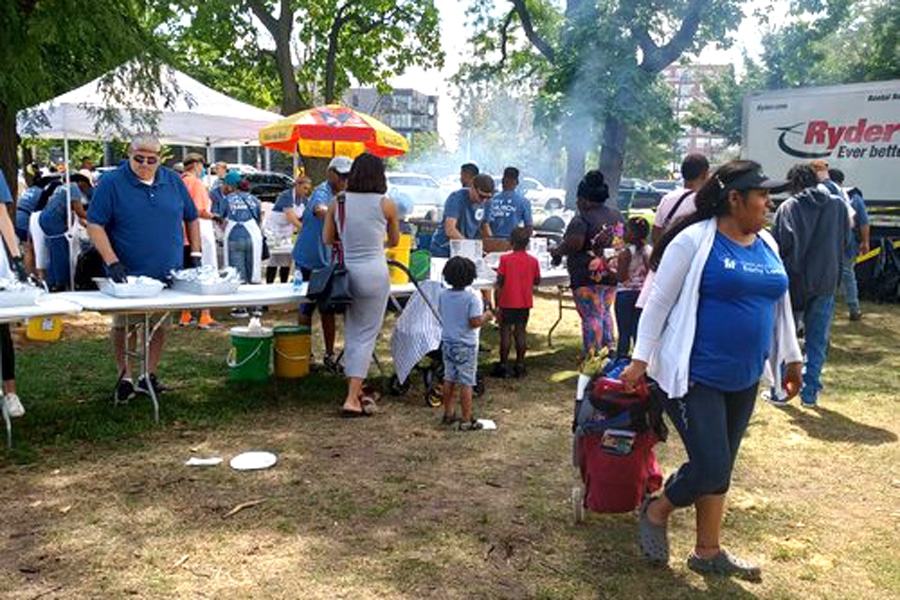
The Safe Cycling project focuses its resources on the South and West Sides of Chicago and aims to partner with community leaders to help distribute helmets. Their first event was at the 27th Ward Community Day on August 27. Juliet found a table at the Community Day by messaging Alderman Walter Burnett, Jr., who she had previously met through her time as a Chicago Peace Fellow.
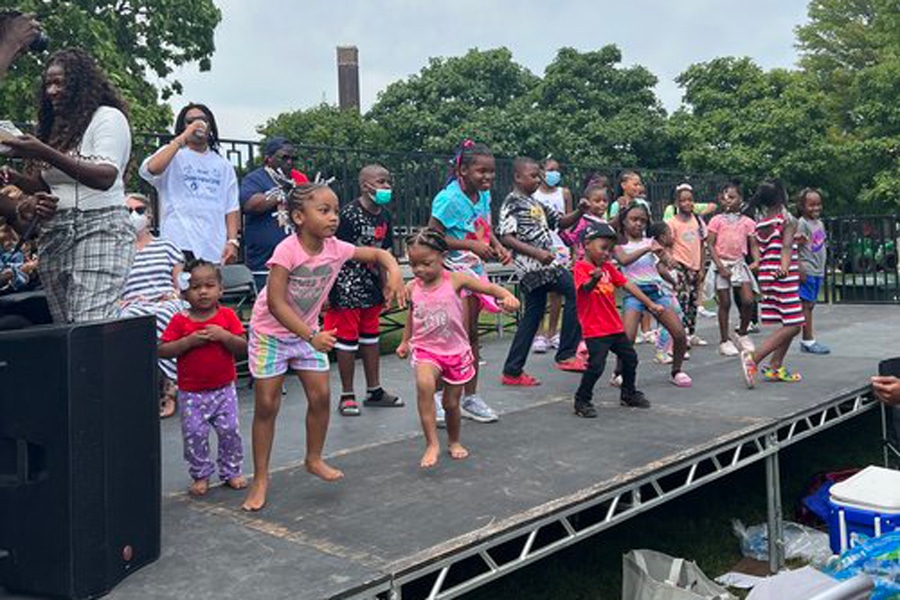
At the Community Day, Juliet was able to hand out 55 helmets:
People were really excited and surprised they could get a helmet for free. Some people were on roller skates, some people were on motor scooters, and they all got helmets.
Juliet also brought other safe cycling activists to the community day by contacting the Chicago Department of Transportation’s SAFE Ambassadors program. Though the SAFE Ambassadors typically work with schools to provide bicycle safety programs, Juliet reached them and discovered they also do other community-based events. Together, both the Safe Cycling project and SAFE Ambassadors made sure everyone at the event interested in receiving a helmet got one. Juliet was ecstatic with their partnership and spoke about how the two tables complemented one another: “When the SAFE Ambassadors didn’t have helmets that fit, they sent people to my table because I bought helmets of all sizes.”
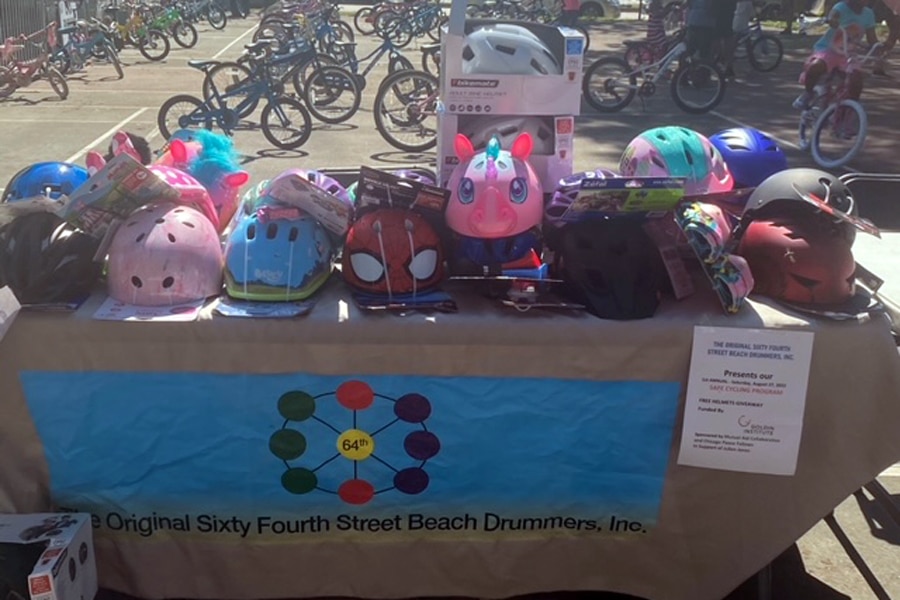
On September 17, the Safe Cycling project partnered with Margaret’s Village to offer helmets to residents of South Chicago. Margaret’s Village is a shelter that provides transitional housing for homeless women, children, and families. Juliet connected with the organization through her work doing HIV education and testing at a social services agency. She spoke with Angela Hicks, Executive Director of Margaret’s Village, and offered for the Safe Cycling program and SAFE Ambassadors to attend their annual Peace Fair. The Peace Fair, a block party that offers violence prevention programming, was an ideal venue to provide bike safety materials and education. When Angela accepted her offer, Juliet organized another table for the Safe Cycling project and gave away 28 helmets and other cycling accessories.
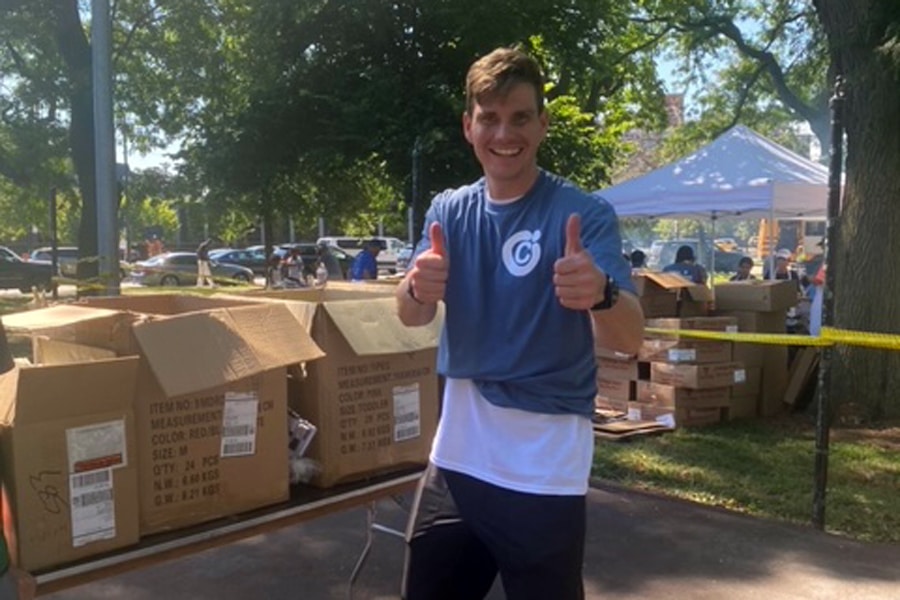
The future of the Safe Cycling project will bring even more collaborations between organizations to distribute helmets in their communities. So far, Juliet has used a range of connections to bring helmets and bike safety instructions to the South and West Sides. She hopes that in the future, she can find even more collaborators and bring more attention to the project. Juliet would like to continue expanding the Safe Cycling project to host an annual event. Through creating grassroots networks with the help of the Mutual Aid Collaborative, the Safe Cycling project has brought needed helmets, bikes, and other resources to people who lacked them. Their work together has played a part in creating safer and healthier communities in Chicago.
Swingset Activism: The Promise of Social Justice Education Inspired by Childhood
By David C. Metler, 2022 Goldin Global Fellow
“Swingset activism asks us to close our eyes and feel that exhilarating liberation you feel as a child on a swing soaring to new heights, perspective, and possibilities.”
Confucius once said that “we have two lives, and the second one begins when we realize we only have one.” I am convinced that social justice education has two awareness deepening lifecycle journeys. The first begins when you connect your personal experience to a systemic level and the second one begins when you realize social justice begins with childhood.
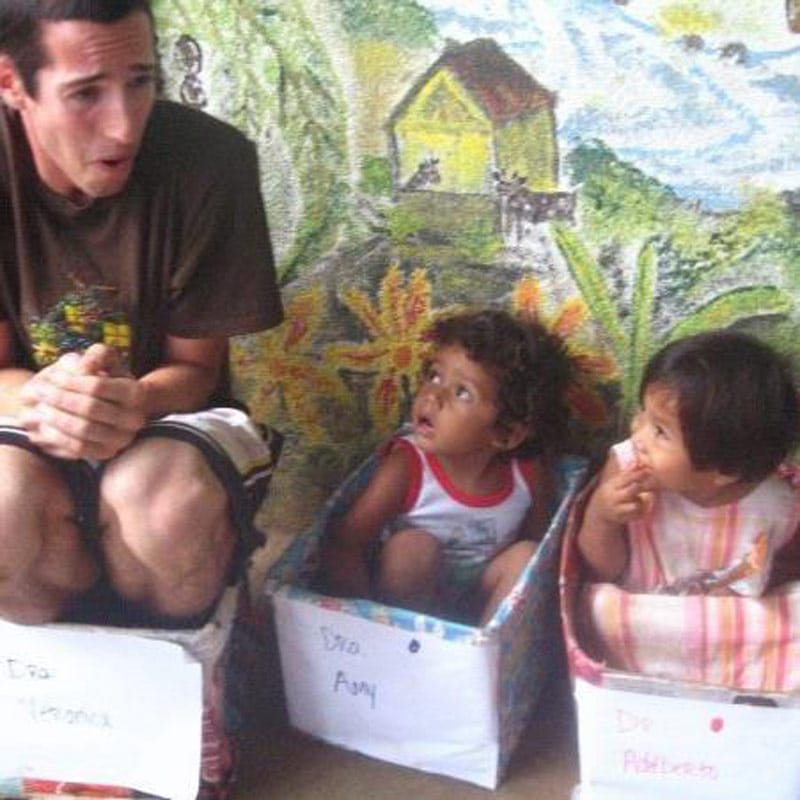
Integrating the Two Journeys
My first formal social justice education experience involved volunteering as a part of the Pangaea World Service Team in Nicaragua when I was a college student at the University of Michigan. It devastated me to learn about the leading role the US has played historically in keeping Nicaragua in poverty. I experienced what Bobbi Harro calls a “critical incident” which “creates enough cognitive dissonance that a change is initiated within the core of a person about what they believe about themselves”. Paulo Freire calls this “conscientizacao” – a transformative process from object to subject that lit my soul on fire for social justice.
Upon returning from this trip, I joined the social justice education University of Michigan’s Program on Intergroup Relations (IGR). Through social justice dialogues, I began to develop critical consciousness around identity, power, privilege, and oppression across personal, interpersonal, institutional, and systemic levels. An IGR mentor told me that there was a book, Parenting for Social Change by Teresa Graham Brett that would “blow my mind.” It completely did.
In bringing together parenting and social change, Teresa integrated her previous social justice education experience around identity and power (being a past co-director of IGR at UM) into her relationships with children. Teresa approached her relationships with children as a personal arena for practicing social justice which was integral to her pursuit of justice in the world. Her book helped me begin to see how a transformation of childhood could transform the world as I realized that there were profound lessons from the wisdom of children and childhood experiences that were invaluable for social justice education and activism.
For more than ten years I have worked with leading child and family activists from across the globe and since 2020, I have created the original concept of Swingset Activism which is currently being studied with a grounded theory approach through creative social justice education with the next generation of changemakers from across the globe. Swingset activism asks us to close our eyes and feel that exhilarating liberation you feel as a child on a swing soaring to new heights, perspective, and possibilities. Swingset Activism is a new type of activism inspired by childhood. There are many types of activism like environmental activism, relational activism, consumer activism, or design activism. Each offers a specific approach and focus lens to changemaking. Swingset Activism is activism generated by love that is integrative, relational, and imaginative. Swingset Activism brings together Ecological Systems Theory (Integrative), Relational Activism (Relational), and the Inner Child (Imaginative). It centers the significance of transforming childhood in activism as a strategy to maximize personal, social, and global transformation.
Swingset Activism brings forth a new level of awareness which catalyzed my search for my own authentic voice at the root of my passion for social justice. As I meditated on finding my inner child’s authentic voice for social justice, what came up for me is the earliest experience of being in the womb is lived experience of the profound interconnection and interdependence of human nature, and for the first few years of infancy there is no “other”. This is important to remember in pursuits of solidarity and partnership in social justice. It is our true nature. It is our original sense of inter-being that acknowledges that all of our liberation is bound together. Through the integration of these insights and practices the elasticity of my own mindset expanded of the whole world being one family and that children are, as Carol Stack would say, “all our kin”.
Understanding the wisdom of my inner child also brought back memories of having a clear, innate sense of right and wrong as a child. This recollection reminds me as an adult that the pursuit of social justice is not performative, but intuitive and relational.
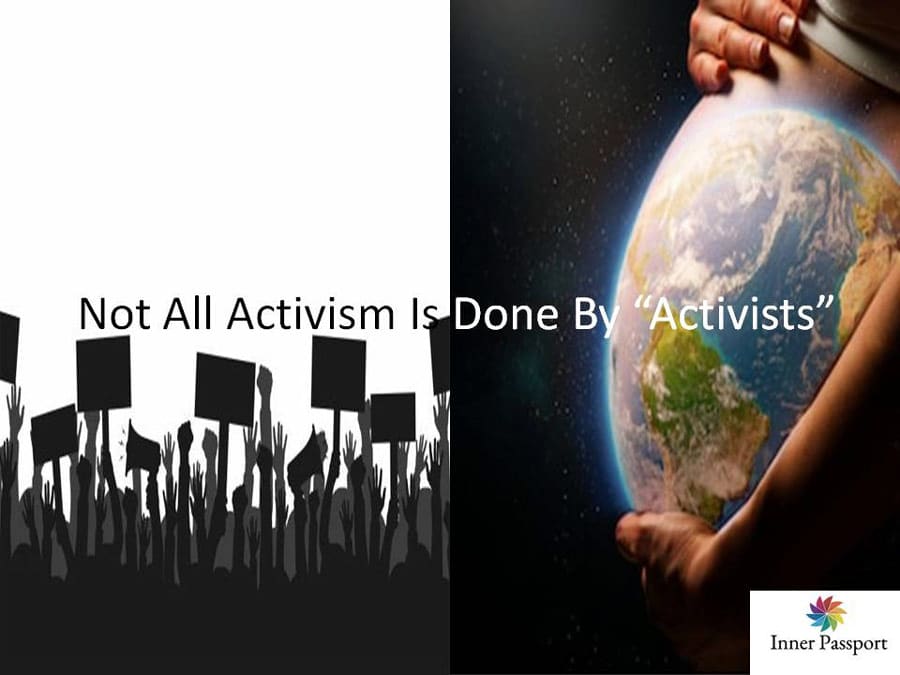
Activism as Relationship
Swingset Activism offers the insight that not all activism is done by “activists.” In their seminal academic article, “Relational Activism: Reimagining Women’s Environmental Work as Cultural Change” Sarah O’Shaugnessy and Emily Kennedy introduce the term “relational activism” for how we approach our personal and private lives that directly affect social change. Relational activism captures the behind-the-scenes, private sphere, community-building work of activism and highlights the importance of community, networks, and communication in contributing to long-term social change. Relational activism values public and private sphere actions equally while honoring the moments of social justice that happen within daily routines and in daily relations with others. For activism to be innovative and to generate a sustainable lifestyle, it needs to live within everyday moments of relationship, especially in building equal power relationships across social identity differences.
I believe that for activism to be integrated into a lifestyle it needs to relational and embrace elements of playfulness, joyfulness, loving-kindness, presence, creativity, and our capacity to re-imagine what’s possible. The process can then match the goal of social justice from integration of these valuable ways of being that children embody most regularly into activism. Audre Lorde says, “the master’s tools will never dismantle the master’s house” which calls upon our imagination and creativity in approaching social justice. I believe it acknowledges the wise contributions of children and childhood experiences in activism. It also serves as a reminder of the solidarity and sacrifice of children and youth literally being on the front lines of social justice movements throughout time, which is not credited since history is typically told by adults.
Intentionally approaching integrity in activism also requires looking critically at what I call the “activist paradox” exploring the ways in activists unconsciously recreate systems of oppression, linked to experiences of oppression in childhood within social justice efforts. Paying attention to these paradoxes will highlight the continual inner work adults need to do to heal their inner child. From reflecting on my childhood, I am able to begin a process of integration that allows me to link the change I wish to see in the world; in myself and my daily routine, ways of being, and relations with others. I have learned to view activism in a relational way that practices social justice in everyday moments, with change happening at the speed of trust, and inner and outer change being interdependent across levels.
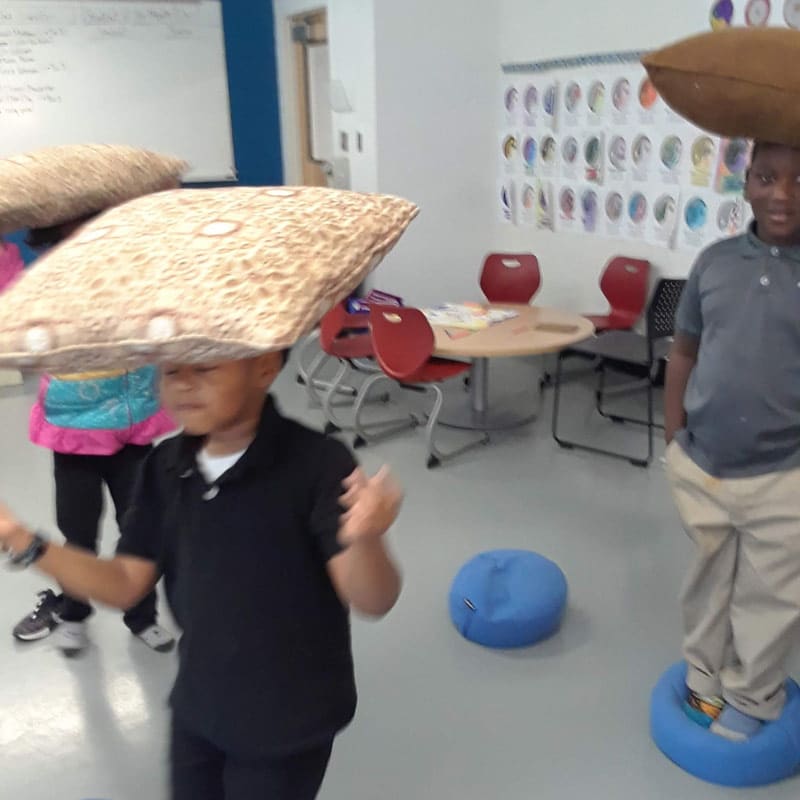
Imagining a Transformed World
As an activist, there is a desire to see clearly the roots of injustice and oppression so that efforts to create change actually transform the systems of oppression and not just the symptoms of oppression. It is known that the nature of oppression is non-hierarchical and intersectional but less known is how oppression is foundational in childhood. The wisdom of the science of relationships has revealed how our earliest relationships set a blueprint for relationships over the lifespan.
Since the oppression of children is the earliest, most normalized, and rationalized form of oppression; it provides the foundation for other forms of oppression because the first relationships in childhood root initial experiences with the common elements of oppression. These common elements of oppression are core to adultism, (the supremacy of adults over children), and underlie oppression in any form:
(1) a false notion of superiority across an identity difference becoming seen as an inherent belief that one identity group is superior to another and
(2) this belief being enforced as justification for the superior group to normalize its power and control over the other to maintain its superiority.
Adultism sets an invisible infrastructure for other socially constructed power-over divides across social identity to find deep hold, especially because children face the oppression of adultism with the least control and capacity to resist or language to make sense of the experience. Oppression then becomes internalized and normalized and the oppressed then become the oppressors, but oppression can be uprooted with the unlearning of adultism and the empowering of children, which is called childism, similar to feminism but for children.
Potentially, the most promising aspect of Swingset Activism, which focuses on social justice beginning with childhood, is that oppression is not only foundational in childhood it is notably the one oppression that all adults have common experience with – although there is difference in how adverse childhood was, everyone experiences adultism in some form during childhood. For example, despite increasing awareness of the commonality of Adverse Childhood Experiences, ACES, the overall experience of childhood involves a lack of control and domination over children by parents, teachers, and a larger institutional and societal culture of adultism. Because all adults were once children and still carry their childhoods within them, the convergence of adulthood and childhood can be comprehended in the mind and the profound interconnection of adult and inner child felt in body.
This shared experience presents an opportunity like no other for interest convergence, a concept that posits that there will only be social justice progress when it is perceived to be in the mutual interests of both the privileged and the oppressed. Unlearning adultism may provide the simplest convergence of mutual interest across a social identity power divide because it so plainly illuminates how deeply our liberation is literally bound up with one another and how adults and children are equal partners in the pursuit of social justice. Adults cannot be truly free until children are free, and until adults heal their inner child from the internalized oppression of their own childhood.
Swingset activism asks us to close our eyes and feel that exhilarating liberation you feel as a child on a swing soaring to new heights, perspective, and possibilities. As Teresa Graham Brett wisely reminded us, we can in full swing begin to “imagine a world where mistrust, power-over dynamics, domination, and oppression no longer exist because children have never experienced them.” We can begin to create a new story of childhood that creates lasting social justice and the transformation of what is possible.
If you would like to be a part of the founding of the Swingset Institute, please contact me at davemetler@gmail.com!
Sincerely,
David Charles Metler
2022 Goldin Global Fellow
Founder, Inner Passport
Moonset Sunrise Promotes Social Justice Through Theater
By Zeki Salah, Facilitator, Mutual Aid Collaborative
From June 8-18, Chicago Peace Fellow, Pilar Audain, acted as a guide for Moonset Sunrise, a theatrical experience rooted in healing, self-care and collective growth through song, storytelling, dance and ritual. Pilar co-created the program alongside the theater company Collaboraction as the inaugural event for Beat Kitchen's new restaurant/lounge and event space: Bar Sol.

Moonset Sunrise was conceptualized by Collaboraction, a social justice theater that builds knowledge, empathy, dialogue and action around oppression and inequity through live theater, film and online interactive programs. Pilar was approached by Carla Stillwell and Anthony Mosely of Collaboraction because they wanted to produce something that would promote healing and connection in the community and had heard of her experience doing ritual healing work. Pilar’s healing work on the Southside, as well as her use of ancient indigenous art forms as healing modalities attracted a lot of attention to her work and the team at Collaboraction asked her to be a priest in their latest production, Moonset Sunrise.

While the team at Collaboraction provided set design, musicians, dancers, and other artists, Pilar was tasked with creating a release experience for members of the audience. Pilar relied on audience participation to create a feeling of freedom and emotional release. For instance, at one point in the play, members of the audience were given a paper and pencil and asked to write down their emotions. They were then told to give the paper to a Goddess statue before the paper was burned by Pilar. By allowing space for emotional vulnerability and reflection, Moonset Sunrise aimed to provide audience members with an acceptance of who they are.

One of the goals of Moonset Sunrise was to make members of the audience feel as though they were entering a safe space and leaving their ordinary lives behind. Pilar and the team at Collaboraction aimed to create an atmosphere where people viewed different forms of art that elicited different emotions. Pilar’s vision of the set and performance were delivered by Collaboration “in the most organic and beautiful way.”

The set of the event included a mock sanctuary with running water that visitors encountered when they came into the auditorium. As audience members watched libations and sacred dances, they were encouraged to relax and focus on their breathing. By creating an immersive experience with different art forms, Moonset Sunrise provided audience members with a variety of modalities through which they could experience healing and release.
One of the outcomes of Moonset Sunrise was that people expected one thing and received what they did not know they needed. -- Pilar Audain Reed

She encouraged members of the audience to focus on the events that led them to their current positions, so that they could better understand themselves. During performances, many members of the audience expressed difficult relationships with loved ones and allowed for a breakdown of the emotional boundaries that are raised in everyday life. This freedom allowed them to focus on how they suffer in many of the same ways and helped them find a common humanity amongst themselves. By the time Moonset Sunrise concluded, many members of the audience were provided with a transformative experience that left them feeling a bit lighter and freer.
Safety Net Launches Blood Drive
By Zeki Salah, Facilitator, Mutual Aid Collaborative
Chicago Peace Fellows are working to address an increased demand for blood from Black and Brown donors through holding a Mutual Aid Collaborative Blood Drive. The Blood Drive is part of an ongoing Safety Net project by the Chicago Peace Fellows Mutual Aid Collaborative, a group of 60 Black and Brown leaders and committed allies who live and work in the communities they serve on the South and West sides. Fellows working on the Safety Net project seek to address multiple pandemics that ail the South and West Sides of Chicago, including COVID-19 and community violence.

The Safety Net campaign is accepting donation pledges until June 28th, but you can donate at any time after making the pledge. You can sign up for the Safety Net team’s blood drive here: https://sleevesup.redcrossblood.org/campaign/give-from-the-heart/
You can also promote the blood drive by using the hashtag: #OurBloodMatters
The Safety Net project started at the height of the COVID-19 pandemic by creating a distributed network of PPE providers throughout a grassroots network, but has since expanded its scope to include broader public health issues. Since its inception, the Safety Net project has also held COVID vaccine clinics to address the disproportionate impact of COVID-19 on Black and Brown communities. The Chicago Peace Fellows Blood Drive is the latest project by the Safety Net team and seeks to address a shortage of Black and Brown blood donors.

More Black and Brown donors are needed in the United States because of a rise in demand for some rare blood types that are more common in people of Black heritage. Certain subtypes of blood need to be matched to treat blood diseases such as sickle cell anemia. Blood donors are screened to see if they might possess certain rare blood types, which can also help match plasma and bone marrow donors. The demand for blood that the Safety Net team seeks to address is expected to increase even more during the summer, due to the increase of accidents such as car crashes and fireworks, as well as spikes in cycles of gun violence. This can put patients who need blood in consistent quantities at risk as these sorts of incidents risk depleting the blood reservoir that their treatments draw from.
The Safety Net wanted to bring attention to the need for a more diverse blood bank after learning that the director of the Chicago Peace Fellows, Burrell Poe, was diagnosed with aplastic anemia. Treatment for aplastic anemia requires bone marrow transplants, which can only be performed if the donor and recipient have matching subtypes of blood. In solidarity with Burrell, the Safety Net team scheduled their Blood Drive around his birthday, so that members of the community could be made aware of the importance of blood donations and their potential to transform the lives of other people.

Jacquelyn Moore of the Safety Net team donated blood in response to the blood drive and found the experience to be fulfilling as an altruistic act, while also gaining new insights into her own health. Jackie was touched by the campaign on a personal level because a blood drive saved her husband’s life after it connected him with a match for a stem cell transplant. She stated “giving blood provides a way to directly help the community and provides people with an opportunity to act, to improve the lives of people around them.” Additionally, Jackie noted the pragmatic benefits donors receive when giving blood. After giving blood, she was contacted by the Red Cross and given a report of her COVID-19 antibodies. She noted that the Red Cross also provides other reports on other aspects of the health of its donors and can act as a free health screening. At the screening, vital signs are checked and problems such as high blood pressure, arrhythmia, or low hemoglobin levels can be detected.
The Safety Net team’s blood drive campaign also seeks to dismiss myths about giving blood. They assert that giving blood is not painful, and can even be relaxing as it gives the donor an opportunity to sit back and take a break from the hustle and bustle of the day. Additionally, the Safety Net encourages members of the LGBTQ+ community to explore the possibility of giving blood, because many of the previous restrictions against donors within this community have been lifted. Lastly, the Safety Net team emphasizes the safety of giving blood, donation centers undergo strict COVID precautions and there is a low risk of contracting COVID while giving blood.
Volunteering: the Key to Peace in Bangsamoro

There is a strong relationship between peace building and the role of volunteerism in the promotion of social cohesion, reconciliation, civic engagement, and the development of local human capacities. Volunteerism generates forms of social capital that are indispensable to peace-building, and it plays an important role in aiding the development of citizens capacities. While every post-conflict situation is unique, volunteerism is known to help regenerate certain fractured or absent dynamics that the processes of reconstruction and reconciliation typically aim to address.
Volunteerism is embedded in the Philippines, as voluntary activities have been carried out for centuries. Bayanihan is the traditional term for volunteerism in the Philippines.
Lo Ivan Castillon, Goldin Global Fellow

The term "bayanihan" relates to ancient traditions of values and is frequently associated with voluntary cooperation, such as when community members help one another move homes.
In the southern part of the Philippines, in the Bangsamoro region, volunteering has a significant role in sustaining the gains of the peace process. Volunteering is manifested in active citizenship in the Bangsamoro Youth Transition Priority Agenda (BYTPA) of the Bangsamoro Youth Commission (BYC). It includes active participation in the creation and appreciation of Filipino arts and culture as well as active volunteerism in youth-focused groups, networks, and other community organizations. Volunteering among diverse youth groups, especially in planning and decision-making for relevant programs conducted by youth-serving ministries and agencies, NGOs, and local government units (LGUs), can help to achieve regional and national peace. All youth are encouraged to share their unique culture, arts, and crafts in order to foster deeper connections and harmony among the different young populations in the region.

This sharing will also help preserve the various subculture’s diverse and amazing customs and arts. Volunteerism that exhibits social awareness and socio-civic consciousness, as well as the formation of values such as compassion for others and social responsibility, are all strategies to achieve active citizenship in community development and nation-building. To achieve this, Bangsamoro Youth Commission strengthens enabling mechanisms like policies and programs that support youth organizations and participation; engages youth in the preservation, protection, development, and promotion of Bangsamoro culture and arts; instils volunteerism through academic and community engagement; and fosters social awareness and responsibility in youth. Active citizenship in this aspect develops strategies to increase the number of youth volunteers in order to facilitate, diversify, and sustain youth volunteerism in the Bangsamoro region.

The Bangsamoro youth defined volunteerism as an interest, a willingness to serve, a passion, a commitment, a selfless act. The youth volunteers commit to being active citizens in promoting BYC's transition agenda based on moral governance, with a focus on utilizing knowledge, strengths, skills, and other resources to promote youth issues in relation to peace and development, and in rendering services without expecting anything in return.

Volunteerism is critical for the Bangsamoro youth because it serves as a reinforcement to the government's efforts and serves as a link between the regional and local governments and the community. Likewise, young people initiate research and data collection in order to express the public's demands and interests. On the other hand, Bangsamoro Autonomous Region in Muslim Mindanao (BARMM) institutions support youth volunteers by providing opportunities for knowledge sharing about health issues and establishing social enterprises for them. Scholarships for Bangsamoro youth and linkages to other organizations may be some of the services provided by the BARMM ministry. Furthermore, the stability of peace and order in some areas of the region must be prioritized to ensure safety, and young people must benefit from peace gains, especially in conflict-affected areas.
In places affected by violence, youth and youth organizations operate in schools or madaris, local communities, and other institutions such as churches and mosques. They focus on offering opportunities for volunteers and young people to engage in social responsibility and become agents of positive social transformation, peace, and sustainable development. Throughout the COVID-19 pandemic, various youth organizations developed projects to aid government and non-government organizations in the fight against the virus. This included hosting online conversations, promoting youth stories, projects, and home quarantine activities which provided psychosocial and peer support to youth during a period where there was a lot of uncertainty, worry, and daily changes.

Like other youth serving organizations in the Bangsamoro, Volunteers’ Initiatives in Bridging and Empowering Society (VIBES), an organization for which I am Founder, started from local youth volunteer outreach activities in Cotabato City and surrounding regions. Following the positive responses, we formed a space called the volunteers hub which allowed volunteers to participate in initiatives that "give back" to the communities. In VIBES, we believe that in everything we do, peacebuilding is our ultimate goal. We believe that all advocacy efforts, whether offline or online, in the areas of empowerment, the environment, and education, among others, contribute to the peaceful and sustainable development of our local communities. Whatever path we take, our goal is to provide avenues for youth advocacy and a chance to bring their visions to life.

In VIBES, we practice the Cycle of VIBES Volunteer Service as a framework of our operation, such as Identification of Volunteer Opportunities, Asset Mapping, Recruitment or Pool of Volunteers, Orientation and Capacity Building, Deployment & Immersion, and Documentation, Monitoring, and Evaluation.

In this endeavor, the whys of volunteering include valuable experience, increasing self-esteem, avenues for awareness and voice, social status, and spaces for social networking. In all of our initiatives, we involve various stakeholders as well as connectors. We make sure to understand the context of the community we serve, practice the Do No Harm principle, map the assets, and address their needs. Cultural sensitivity and a safe approach are significant. That is why speeches, words, and terms matter. We continue to explore and welcome innovative approaches, especially as we are dealing with young Bangsamoro.

Volunteers play a crucial role as enablers and multipliers in shaping the Bangsamoro youth as proactive agents of peace, development, and social transformation. The youth advocate moral governance as the guiding principle for all development programs. It stems from the willingness of the youth volunteer to serve in accordance with God's will. In full support of the whole-society approach, the idea of inclusion is implemented in order to promote a safe, non-discriminatory environment. It promotes respect for ethnic, gender, religious, and cultural diversity. The efforts and contributions of the youth volunteers introduce developments to the existing public and private sector systems and mechanisms. In the volunteers' continuous pursuit of social transformation, they serve as a key to sustaining the gains of the peace process in the Bangsamoro region and an extension of the development partners by maintaining the latter's ideals and aspirations in relation to the Bangsamoro's principles and vision.
Connecting Community Members with the Research of the University of Chicago Crime Lab
By Zeki Salah, Facilitator, Mutual Aid Collaborative
Chicago Peace Fellows hosted a conversation at the Firehouse Community Arts Center on June 3, 2022 to discuss community safety and crime data with the University of Chicago Crime Lab. The event was held as part of the Mutual Aid Collaborative’s Civic Leaders series, which is designed to connect alumni of the Chicago Peace Fellows with policy makers, academics, and community activists that are leading innovative work to promote community safety and prevent violence in their neighborhoods.

At this event, the Peace Fellows met with Kim Smith, the Crime Lab’s Director of Programs, to learn about data that the Crime Lab collects and how it has been used to shape policy decisions. Members of the Lawndale community also came to attend the presentation and learn about how they can engage with the Crime Lab’s research.

The Crime Lab’s presentation focused on the disproportionately high rate of gun violence in Chicago as well as the disproportionate impact of this violence on communities of color. In 2020, there was an increase in violence crimes, and homicides in particular, in Chicago. While other large cities such as Los Angeles and New York have lowered their homicide rates, Chicago’s rate of homicides has increased from 2010-2020. This violence also affects men of color more so than any other group: 80% of shooting victims in 2020 were Black and 86% were male. Black men also carry a dual burden of incarceration alongside gun violence victimization, with the percentage of Black men aged 20-24 being over five times greater than the percentage of white men of the same age group.

Peace Fellows, the Crime Lab, and other members of the community spent much of their time together talking about the causes of this disproportionate violence and potential solutions. The Crime Lab noted that the majority of homicides were not motivated by money, gang interests, or other instrumental purposes, but were spurred by personal altercations between individuals. Members of the community attributed some of the causes of the increase in violence to the way incarcerated people are rehabilitated and to increased absences in schools after the outbreak of the COVID-19 pandemic. Community members and Kim Smith of the Crime Lab mutually agreed that street outreach workers who work at personal level with community members are often successful in addressing these kinds of personal altercations and that there is a need for funding in this area.

Meeting together helped Peace Fellows build connections between their own experiences and the data captured by the Crime Lab. In their presentation, the Crime Lab showed that 16,000 children became disengaged during the pandemic. Pamela Montgomery-Bosley began working as a violence prevention manager with youth after her son was shot and killed and spoke to her experience working with children in unstable homes. She spoke to her experience seeing children struggle with their home lives while finding some stability at school, but noted that schools are now having difficulty keeping children in classrooms. Kim supported this argument by citing Crime Lab data that over one in nine children in options schools, which are largely composed of students who were previously disengaged from school, have been involved in violent incidents. She also noted the increased rate of victimization and arrests amongst option schools students.
Meeting with the Crime Lab showcased to Peace Fellows how data can give deeper insight into the disproportionate levels of violence in communities of color. Data can support personal experiences around issues such as violence and disengagement in school, giving them greater weight. This can enhance communications, donation campaigns, and grant proposals for grassroots organizations in need of resources. Kim encouraged Peace Fellows to request data from the Crime Lab to supplement their own work, noting that even if the Crime Lab does not have data around specific issues, a request could help direct future research.
The meeting between Peace Fellows and the Crime Lab worked to bridge the gap between the research of the Crime Lab and the members of the communities they study. Kim Smith noted that the Crime Lab often has difficulty connecting with grassroots leaders and sharing its data and that they are looking for ways to engage more with local communities. By connecting with the Peace Fellows, the Crime Lab will be able to better share its research and direct its focus towards interests that are guided by community input. This in turn will help the Crime Lab provide community members with a deeper understanding of the problems they are facing and offer potential solutions to the spread of violence.
